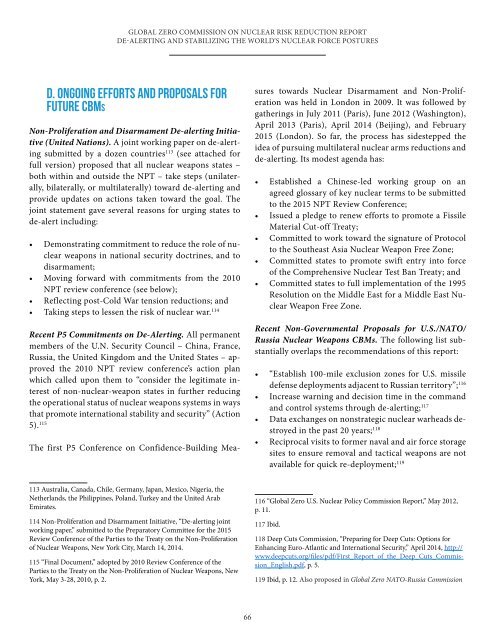global_zero_commission_on_nuclear_risk_reduction_report
global_zero_commission_on_nuclear_risk_reduction_report
global_zero_commission_on_nuclear_risk_reduction_report
Create successful ePaper yourself
Turn your PDF publications into a flip-book with our unique Google optimized e-Paper software.
GLOBAL ZERO COMMISSION ON NUCLEAR RISK REDUCTION REPORTDE-ALERTING AND STABILIZING THE WORLD’S NUCLEAR FORCE POSTURESD. ONGOING EFFORTS AND PROPOSALS FORFUTURE CBMSN<strong>on</strong>-Proliferati<strong>on</strong> and Disarmament De-alerting Initiative(United Nati<strong>on</strong>s). A joint working paper <strong>on</strong> de-alertingsubmitted by a dozen countries 113 (see attached forfull versi<strong>on</strong>) proposed that all <strong>nuclear</strong> weap<strong>on</strong>s states –both within and outside the NPT – take steps (unilaterally,bilaterally, or multilaterally) toward de-alerting andprovide updates <strong>on</strong> acti<strong>on</strong>s taken toward the goal. Thejoint statement gave several reas<strong>on</strong>s for urging states tode-alert including:• Dem<strong>on</strong>strating commitment to reduce the role of <strong>nuclear</strong>weap<strong>on</strong>s in nati<strong>on</strong>al security doctrines, and todisarmament;• Moving forward with commitments from the 2010NPT review c<strong>on</strong>ference (see below);• Reflecting post-Cold War tensi<strong>on</strong> reducti<strong>on</strong>s; and• Taking steps to lessen the <strong>risk</strong> of <strong>nuclear</strong> war. 114Recent P5 Commitments <strong>on</strong> De-Alerting. All permanentmembers of the U.N. Security Council – China, France,Russia, the United Kingdom and the United States – approvedthe 2010 NPT review c<strong>on</strong>ference’s acti<strong>on</strong> planwhich called up<strong>on</strong> them to “c<strong>on</strong>sider the legitimate interestof n<strong>on</strong>-<strong>nuclear</strong>-weap<strong>on</strong> states in further reducingthe operati<strong>on</strong>al status of <strong>nuclear</strong> weap<strong>on</strong>s systems in waysthat promote internati<strong>on</strong>al stability and security” (Acti<strong>on</strong>5). 115The first P5 C<strong>on</strong>ference <strong>on</strong> C<strong>on</strong>fidence-Building Mea-sures towards Nuclear Disarmament and N<strong>on</strong>-Proliferati<strong>on</strong>was held in L<strong>on</strong>d<strong>on</strong> in 2009. It was followed bygatherings in July 2011 (Paris), June 2012 (Washingt<strong>on</strong>),April 2013 (Paris), April 2014 (Beijing), and February2015 (L<strong>on</strong>d<strong>on</strong>). So far, the process has sidestepped theidea of pursuing multilateral <strong>nuclear</strong> arms reducti<strong>on</strong>s andde-alerting. Its modest agenda has:• Established a Chinese-led working group <strong>on</strong> anagreed glossary of key <strong>nuclear</strong> terms to be submittedto the 2015 NPT Review C<strong>on</strong>ference;• Issued a pledge to renew efforts to promote a FissileMaterial Cut-off Treaty;• Committed to work toward the signature of Protocolto the Southeast Asia Nuclear Weap<strong>on</strong> Free Z<strong>on</strong>e;• Committed states to promote swift entry into forceof the Comprehensive Nuclear Test Ban Treaty; and• Committed states to full implementati<strong>on</strong> of the 1995Resoluti<strong>on</strong> <strong>on</strong> the Middle East for a Middle East NuclearWeap<strong>on</strong> Free Z<strong>on</strong>e.Recent N<strong>on</strong>-Governmental Proposals for U.S./NATO/Russia Nuclear Weap<strong>on</strong>s CBMs. The following list substantiallyoverlaps the recommendati<strong>on</strong>s of this <strong>report</strong>:• “Establish 100-mile exclusi<strong>on</strong> z<strong>on</strong>es for U.S. missiledefense deployments adjacent to Russian territory”; 116• Increase warning and decisi<strong>on</strong> time in the commandand c<strong>on</strong>trol systems through de-alerting; 117• Data exchanges <strong>on</strong> n<strong>on</strong>strategic <strong>nuclear</strong> warheads destroyedin the past 20 years; 118• Reciprocal visits to former naval and air force storagesites to ensure removal and tactical weap<strong>on</strong>s are notavailable for quick re-deployment; 119113 Australia, Canada, Chile, Germany, Japan, Mexico, Nigeria, theNetherlands, the Philippines, Poland, Turkey and the United ArabEmirates.114 N<strong>on</strong>-Proliferati<strong>on</strong> and Disarmament Initiative, “De-alerting jointworking paper,” submitted to the Preparatory Committee for the 2015Review C<strong>on</strong>ference of the Parties to the Treaty <strong>on</strong> the N<strong>on</strong>-Proliferati<strong>on</strong>of Nuclear Weap<strong>on</strong>s, New York City, March 14, 2014.115 “Final Document,” adopted by 2010 Review C<strong>on</strong>ference of theParties to the Treaty <strong>on</strong> the N<strong>on</strong>-Proliferati<strong>on</strong> of Nuclear Weap<strong>on</strong>s, NewYork, May 3-28, 2010, p. 2.116 “Global Zero U.S. Nuclear Policy Commissi<strong>on</strong> Report,” May 2012,p. 11.117 Ibid.118 Deep Cuts Commissi<strong>on</strong>, “Preparing for Deep Cuts: Opti<strong>on</strong>s forEnhancing Euro-Atlantic and Internati<strong>on</strong>al Security,” April 2014, http://www.deepcuts.org/files/pdf/First_Report_of_the_Deep_Cuts_Commissi<strong>on</strong>_English.pdf,p. 5.119 Ibid, p. 12. Also proposed in Global Zero NATO-Russia Commissi<strong>on</strong>66


